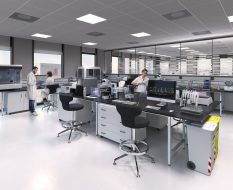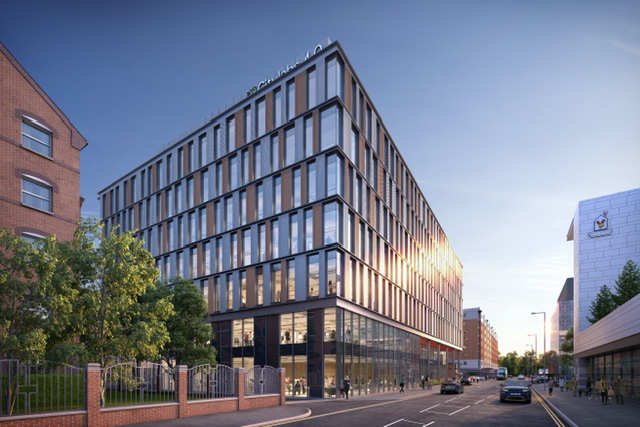Work has commenced construction on a £42m, 125,000 sq ft specialist lab and office workspace at the Citylabs cluster to strengthen the internationally significant health innovation campus.
With the UK in the midst of a significant shortage of lab space to support the demand and burgeoning growth of the life sciences sector, Citylabs 4.0, located within Manchester University NHS Foundation Trust’s (MFT) Oxford Road Campus, will offer world-leading, highly specialist space specifically designed to support companies working in precision medicine, including those in diagnostics, genomics, biotech, medtech and digital health.
The seven-storey development incorporates infrastructure to accommodate CL2 labs and specialist equipment, including increased floor loading, enhanced cooling systems and ventilation provisions, and a large platform lift.
Businesses that locate here will also benefit from 100GB superfast connectivity, shared breakout spaces, an internally secure cycle storage with showers and kit drying room, and have access to the campus’ 150-person event space, multiple meeting rooms, cafes and supermarket.
The campus, created in a joint venture partnership between Bruntwood SciTech and MFT, provides innovative life science and healthcare businesses with a unique opportunity to gain direct access and collaborate with the UK’s largest NHS Trust.
As part of the support provided by the joint venture, businesses receive access to R&D and funding support, as well as opportunities including joint clinical trials, sample supply, diagnostic collaborations and medtech adoption, faster than anywhere else in the UK. They can also access the world-class talent and research capabilities of MFT, the University of Manchester, and Manchester Metropolitan University.

Citylabs is surrounded by some of the UK’s most eminent teaching hospitals including the Royal Manchester Children’s Hospital, Manchester Royal Infirmary (with emergency helipad access), Saint Mary’s Hospital and the Manchester Royal Eye Hospital, and is located in the heart of the city’s Oxford Road Corridor innovation district, home to 50% of the city’s life science businesses and is Europe’s largest clinical academic campus, generating around £3bn GVA each year. The campus is also a government-designated High Potential Opportunity Zone for Diagnostics and Healthy Ageing, and a named Enterprise Zone. Sitting at the heart of the city’s health and life science cluster, it is surrounded by world-class research centres including Manchester Centre for Genomic Medicine, The University of Manchester Faculty of Biology, Medicine and Health, the National Institute for Health and Care Research (NIHR) Manchester Clinical Research Facility, and the Pankhurst Institute. It is also home to the NIHR Manchester Biomedical Research Centre.
The development of Citylabs 4.0, the third phase in the Citylabs masterplan taking the campus from 192,000 sq ft to 327,000 sq ft, will build on and enhance the existing health innovation cluster at Citylabs, which is home to more than 20 life science and healthcare businesses including global molecular diagnostics company Qiagen who opened their Global Centre of Excellence for Precision Medicine at Citylabs 2.0 in November 2021, new generation molecular diagnostics business Apis Assay Technologies, ophthalmic instrument manufacturer Takagi, and one of Europe’s largest contract research organisations MAC Clinical Research. It will also contribute to the creation of more than 300 additional high value jobs.
Citylabs 4.0 is expected to achieve net zero carbon in construction and operation in its shared spaces and will be 100% electric. As a highly energy efficient building, it is targeted to be EPC A and include 208m2 of solar panels, enough to charge an average electric car approximately 1235 times. The building’s cladding system will be made from 75% recycled end-of-life aluminium (post-consumer scrap), meaning its content will have one of the smallest carbon dioxide footprints worldwide; seven times less than the global average for aluminium production.
With the site having undergone enabling works since early this year, Contractor GMI Construction Group has been appointed to build the Sheppard Robson-designed development and local teams also working on the development include Arup, Hilson Moran, Gardiner and Theobald, and Layers. It is expected to open in Spring 2025. The development of Citylabs 4.0 is supported by a £32m senior loan from the North West Evergreen Fund, managed by CBRE’s Investment Advisory team, which is part of CBRE Capital Advisors.
Dr Kath Mackay, Director of Life Sciences at Bruntwood SciTech said: “There has never been a greater opportunity for the UK and Manchester to support the life science sector as there is currently by investing in the much needed specialist lab space and infrastructure companies need to scale and collaborate. Manchester’s life science ecosystem continues to thrive and at Citylabs through our partnership with MFT we can provide businesses with direct access into the NHS and have tests and treatments adopted at a faster pace and scale here more than anywhere else, resulting in improved healthcare for the people of Manchester and wider region.
“As the Citylabs campus approaches its 10th anniversary, we’re excited to get underway with Citylabs 4.0 and look forward to welcoming new businesses to this community and world-leading hub for health innovation, and continuing to enhance the city’s knowledge economy and private, academic and clinical collaboration opportunities.”
Professor Rick Body, Group Director of Research and Innovation at MFT, said: “As one of the UK’s leading healthcare providers we are committed to improving patient treatment and care through research and innovation, so we are delighted to see the expansion of Citylabs continues at our Oxford Road Campus.
“Citylabs provides a unique platform to involve clinicians, patients, and our communities, at the start of the research innovation journey. It also meets our ambition to strive for the highest possible standards of sustainability in healthcare for the benefit of future generations. We look forward to welcoming new partners from the life sciences industry to co-locate, along with the opportunity to develop our hosted research and innovation infrastructure.”







